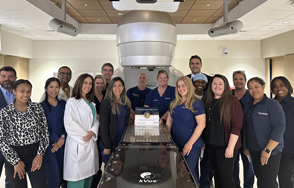

Previously, requests to add facilities to an existing accreditation had to wait until the next cycle, delaying the process of solidifying or aligning procedures in newly acquired or built facilities. To address this, APEx initiated a satellite synchronization process that allows practices to add new facilities to their current accreditation cycle. Any new satellite(s) will be assessed on their compliance with the APEx Standards, going through the same rigorous process as the previously accredited facilities. This process is open to APEx-accredited practices that want to add new facilities during the accreditation process or within the first three years of their four-year accreditation cycle.
The first practice to take advantage of this option was the Miami Cancer Institute. They opted to bring their new facility in Plantation, Florida, into alignment with their main facility in Miami, which received APEx accreditation in 2021 and was the first APEx-accredited proton center in south Florida. The newly added satellite at Plantation is also the first APEx-accredited facility in Broward County. We spoke with Alonso Gutierrez, PhD, MBA, Assistant Vice President, Chief Physicist at Miami Cancer Institute and Vice Chair of Medical Physics and Dosimetry at Florida International University, and Shandelle Castillo, MHA, Radiation Oncology Program Coordinator at Miami Cancer Institute, to get a firsthand account of what influenced their decision to choose APEx and their experience with the satellite synchronization process.
Gutierrez stated, “We wanted to have the same standards across all our radiation oncology centers within the Baptist Health South Florida enterprise and given that our satellite functions identically to our main site, just at a different physical location, it was something that was somewhat of a no-brainer for us to do.” Gutierrez says he expects that any future satellites within their network will also be APEx-accredited. “We didn’t really question [why APEx] because we feel it’s very RO-specific and RO-dedicated, and from a quality of standards perspective, we firmly believe in the practice standards that APEx sets forth [for patient care].”
When asked about the process itself, Castillo reported “the process was fairly easy; [ASTRO staff] gave us a timeline for everything and provided all the documentation that we needed, and then the on-site review was very well organized.” Gutierrez added, “We had a kickoff meeting to really talk about the expectations of [the process], and it was very much in sync with the main site accreditation, making it easy for us to leverage a lot of the work we had previously done.”
The process consists of a practice submitting an application for synchronization, paying an additional fee and scheduling an in-person facility visit. The visit results are sent to ASTRO’s Practice Accreditation Subcommittee and follows the normal process to determine the facility's accreditation status. If the facility receives full accreditation, it will be added and “synced” to the practice's cycle.
“Synchronization is a great word because it actually parallels the expectations of the main site, but it’s done at a level of efficiency. The process is done just as rigorously, but efficiently and streamlined, so redundancy gets minimized. You can focus on the key aspects of the program, knowing that the main site has already gone through the more demanding documentation and process development [components].”
The new APEx satellite synchronization process is intended for practices to maintain high standards of care as they grow and ensure those standards are maintained across all facilities within a practice. “We thought the process was well organized and well structured”, says Gutierrez. He notes that accreditation is important to patients as well. “They may not know what it entails, but for [us] to say [we’ve] gone through a rigorous process for high quality [care] adds credibility to the organization.”
If your practice could benefit from the APEx satellite synchronization process, contact ASTRO staff and get started today!


